Valar Morghulis!
The tale of Cersei Lannister (Lena Headey) is a tragic one. Regardless of whatever fate awaits her at the conclusion of Game of Thrones, she has lost a significant amount on her journey thus far and those losses come to the forefront of her character arc in “The Dragon and the Wolf.” Each of Cersei’s pivotal scenes in the episode takes place within the context of what and whom she has lost. In her final sequence of the hour, the writing brings home all of her losses as she is poised to reckon with what is arguably her most critical loss yet. As she stands upon the edges of her poetically painted map of Westeros, a byzantine mixture of pride, fury, regret, and shame are underlined by a formidable sense of fortitude.
When we first meet Cersei, she is standing right next to her brother and soon-to-be-revealed lover, Jaime (Nikolaj Coster-Waldau). They’re quietly overlooking the body of the former Hand of the King, Jon Arryn (John Standing). There’s an air of imperiousness about Cersei, but nothing less could be expected of a woman who was Queen of the Seven Kingdoms. When she arrives in Winterfell, her haughty demeanor is intensified but we as the audience are after all now looking at her through the prism of the much more amenable Stark family. The premiere ends with the audience shockingly realizing that Cersei is in an incestuous relationship with her own brother. The subsequent attempted murder of a child at Jaime’s hand (sorry) creates a marked attitude towards Cersei that becomes difficult to shake, especially after she has Lady executed in “The Kingsroad.”
As the series slowly traverses the treacherous gardens of King’s Landing Lady Olenna (Diana Rigg) so notably loathed, the audience slowly garners more glimpses at who Cersei Lannister really is underneath the haught and incest. The most illuminating scene early on (arguably one of the most elegantly written sequences of the whole series) is when Cersei is speaking to Robert (Mark Addy) about their marriage being the foundation of stability upon which the Seven Kingdoms is sitting. They laugh at the ironic incredulity of that reality, their laughter intertwined with a torrent of sadness and regret.
The greatest tragedy for Cersei in her mind is that she was born a woman. When she looks upon Jaime, she sees a knight in shining armor who brandishes a sword with an unparalleled bravery. When she looks upon Tyrion (Peter Dinklage), she sees a monster who killed her mother and who has a higher place in society in spite of him being a dwarf. She sees a man whose constant whoring undermines the Lannister name. When she looks upon Tywin (Charles Dance), she sees a man of formidable strength. She sees the true embodiment of the words of House Lannister: a lion whose roar could be heard from Sunspear to the gleaming shores of White Harbor. When she looks upon herself, she sees a woman of great cunning and boldness, but one who was denied opportunity after opportunity on account that she lacked a little worm growing between her legs.
When she confronts Robert as Eddard Stark (Sean Bean) lies injured in bed, she retorts that she ought to wear the crown and he ought to wear the gown. Robert strikes her in response but Cersei reads that strike as an affirmation of her deep-seated belief that had she been born a man, she would be the one to inherit the formidable legacy of Tywin, the man whose shadow continues to hover feverishly over the series long after his demise. She would be the one in charge and not beholden to a whoring, stupid, and drunken brute.
Robert’s death leaves the door open for Joffrey (Jack Gleeson) to become king; yet this joy of Cersei’s lasts shortly. When Joffrey decides to behead Eddard in public, Cersei’s expression is that of an immediate panic. Her undying devotion to Joffrey is no doubt a contributor to his psychopathic behavior but in that moment, a part of her realizes who is in front of her. Her slapping of Joffrey in season two is an expression of anger at yet another man who has let her down. Her father was the first, Tyrion was the next, Jaime followed, and now Joffrey.
When Cersei is a child, she goes on a little journey through a forest with her friend. Cersei has heard stories of an old witch named Maggy the Frog, who foretells fortunes from a dingy hut. A wise witch, Maggy ruefully notes that people often want to hear their fortunes until she actually spoke them out loud. Cersei impetuously ignores her advice, threatening the witch that if she did not acquiesce to her desires, then her father would have the last word regarding her fate. Maggy smiles ruefully and notes a few key prophecies that would doggedly follow Cersei for the rest of her life.
Cersei wants to be queen from a young age, an idea no doubt fostered in her mind by Tywin’s desire to spread the lion’s roar as far and wide from Casterly Rock as possible. She was to marry Prince Rhaegar of House Targaryen, but Maggy assures her that she was instead going to marry the king. Cersei remains thrilled, perhaps under the impression that she would marry Rhaegar after his ascension to the throne. Maggy adds that while the king would have twenty children, Cersei would have three. Cersei’s smile fades a bit. Maggy continues with some understandable glee that all three of her children would have golden crowns and shrouds. Cersei’s smile disappears entirely and her visage is instead ensconced within a paradigm of fear. Maggy laughs before the scene cuts away to Cersei riding up to the Sept of Baelor, where Tywin’s body was buried.
While the show did not go into the valonqar theory, those prophecies at the beginning of “The Wars to Come” were enough to send Cersei into a tailspin throughout her adolescence and her adulthood. Whenever there seems to be an opportunity that would negate Maggy’s prophecies, such as the promise of Rhaegar’s hand in marriage or Robert being a worthy husband, those opportunities are cruelly taken away. At a certain juncture, Cersei simply accepts the reality of the prophecies and vows to thwart them at every juncture.
When Joffrey is strangled by a purple poison, Cersei’s resolve is shaken but not broken. That Joffrey was what he was softens the blow, even if he was her first born child. Myrcella’s (Nell Tiger Free) death, however, tears her resolve apart. Myrcella had been such a sweet child, she rues, one who was far more pure and kind than she could ever have hoped for. It was a moment of revelatory reckoning for Cersei, a moment where she acknowledges to herself and out loud what kind of person she has become. She becomes more protective of Tommen (Dean-Charles Chapman) but that protectiveness begins to ebb away when, in her mind, he betrays her to the Faith by outlawing trials by combat. His suicide is met with neither anger nor an outpouring of sadness but instead resignation.
With Tywin’s death, the fortunes of House Lannister began to fall but for Cersei that murder nevertheless ends up providing the opportunity she had always wanted. The struggle over Tommen and thus the power of the Iron Throne between her and Margaery (Natalie Dormer) coincided with her stacking the Small Council with her sycophants. The appointment of Qyburn (Anton Lesser) in particular proved to be a matter of chagrin. Kevan Lannister (Ian Gelder) forcefully charges that Cersei was merely attempting to provide a verisimilitude of autonomous leadership and little more. His retort, however, underlines the misogyny Cersei has faced throughout her life and arguably internalized.
The greatest tragedy of Cersei Lannister is that all of her leadership mistakes, and there are plenty, are always addressed through the prism of her being a woman. When Kevan retorts that Cersei is the Queen Mother and nothing more, what he is in actuality saying is that her identity as an individual woman is secondary to her identities tied to relationships with other men, be they her king or her sons. Few people ever tell Cersei what her leadership mistakes are and how she could fix them. Far more people tend to express their opinion that she as a woman does not have any authority at all and thus any leadership of hers is negligible. Every time this occurs, Cersei’s self-loathing and loathing of others deepens; her resolve to chart her own path forward strengthens, regardless of how destructive that path may be in actuality. It becomes a vicious cycle and when that cycle is at its most low, she snaps.
The destruction of the Sept of Baelor is Cersei’s upending of the chess board that she felt never provided her an equal-level playing field to begin with. If the men have a disproportionate share of the pawns, what was left for her to do? After suffering the humiliation of her Walk of Shame, she thought that she at least has the trial by combat option to ensure her victory. When that is taken away from her, she could not bear the thought of suffering any sort of public humiliation ever again. She destroys the chess board and several major players along with it for good measure.
When Cersei is crowned, the simplicity of her crown betrays a pathos of complexity. The crown is quite literally fashioned to look like the mane of a lion, the mane that Cersei as a female Lannister was never privy to, nor its many privileges. The crown was her declaring to the realm of Westeros that she was the true heir to the Lannister legacy. It was her declaration that she has proven to her father even after his death that she is the one who is worthy of carrying forth the power he had built.
Tywin at one juncture sharply notes to Cersei that he mistrusts her not on account of her gender but her overestimation of her own intelligence. Nevertheless, Cersei takes in her entire experience with her father into account and arrives at the conclusion that Tywin is lying. That sharp barb no doubt stays in her mind, a quiet but powerful motivator. With her power grab, in her mind she proves to Tywin that she is in fact as intelligent as she believed herself to be. She is on the Iron Throne and most of her enemies lay in smoldering ruins.
Cersei begins season seven on the Iron Throne but in a position of extreme vulnerability. Her season seven arc, however, arguably defies expectations. She displays a knack for politicking that would possibly have made Tywin proud (such as convincing the lords of the Reach to turn on the Tyrells) and she even manages to fulfill a payment to the formidable Iron Bank of Braavos. She sends Euron (Pilou Asbæk) off to ferry the Golden Company from Essos, although that seems to be a potentially dubious move. She holds onto the Iron Throne in spite of the seemingly unsurmountable odds stacked against her, even if that hold is now looking to be exceedingly tenuous.
Cersei nevertheless has somewhat of a grasp on the fragile nature of the power she holds, even if she is unable to comprehend its totality. There is a part of her that when she sees Daenerys arrive on Drogon to the Dragonpit that understands Jaime’s dire warnings of their inevitable doom. That part of her listens to Jaime’s feverish account of the Battle of the Blackwater Rush (not calling it the Loot Train Attack, sorry) and comprehends the severity of the consequences they are likely to face. She keenly observes, however, that there were only two dragons at the Dragonpit and this once again raises the specter of plotting within her. Cersei had defied the chess board again and again and a part of her strongly believes that she will be able to do it once more.
It is with Tyrion, strangely yet appropriately enough, that Cersei is able to be her most vulnerable. The relationship between the two of them, considerably fraught and quite a bit more complex than sheer hatred, was inescapably shaped by the death of Cersei’s mother in childbirth. As a child, Cersei perhaps sees a thing that had killed her mother. She certainly talks of her baby brother as if he was a monster, the same monster whose stories had excited a young Oberyn (Pedro Pascal) before he realizes the monster had never existed, only a child. Even after realizing Tyrion was not responsible for the death of Joffrey, Cersei still holds him responsible for the deaths of her other children and their father, the last of whom he is certainly responsible for. Cersei, however, also realizes that if Tyrion had not committed patricide, then she likely was not going to be the recipient of her position of power. The realization irritably eats away at the hatred she is determined to never let go.
Cersei in “The Dragon and the Wolf” is presented with two distinct opportunities to commit murder and both of these opportunities she lets slip through her fingers. Tyrion tearfully rails that he has wanted to kill her more times than he could count. He rants that he is right there in that room and she could strike him down with a single nod to her monster bodyguard. Cersei shakes with anger and tears of fury but she is unable to even give the nod in the Mountain’s direction to have Tyrion killed. He pours her a glass of wine in drunken solidarity and implores her yet again to fight for the sake of her family, including her unborn child.
A defining trait of Cersei has been her unabashed love for her children. One could argue that she loves her children in a way that is damaging, especially in the case of Joffrey, but love them she does. Robert is abusive, Jaime is far too reckless, but her children are always there for her. By the time she has lost all three of them, she hardens to the world, as if determined to never be privy to such a weakness ever again. When she becomes pregnant, however, the idea of just her and Jaime against the world begins to change.
Lena Headey notes that she believes Cersei has never truly loved Jaime. In the moment where he is arguing they should honor their pledge of fighting in the north, Cersei realizes this truth. Cersei, more than loving him, has always wanted to be Jaime. That desire of being him and having everything that he has from his sword to his name to his masculinity manifested itself into a set of sexual and romantic desires. The underlying want to be him, however, never changes. Her want to be the mane of the Lannister lion remains strong.
Cersei realizes she became whom she had always imagined Jaime to be. She has the power, the control, the command and now with a new Lannister child on the way, she could have everything she had ever wanted. She puts the decision in his hands as an indicator of that mindset, coolly noting that no one walked away from her. In a shocked response, Jaime asks if she was going to have him killed. She ponders for a moment about that decision, about throwing away a part of her life that has been so integral for so long and gives the nod.
The audience gasps when the Mountain’s sword leaves its sheath. Jaime in a stunned, broken disbelief does not believe she would give the order for the sword to slice through his flesh. He walks away as a symphony of Cersei’s themes swells in the background. Cersei walks forward quickly but then stops herself right before the edge of the painted map of Westeros. A fascinating mixture of grief, anger, and strength etches across her visage. We see a Cersei who in many ways is the powerful son Tywin always wanted, a Cersei who casts aside the traps of her past and embraces the name Lannister and its legacy all for her own. Everyone walks away from her but she stands steadfast. For now.
Valar Dohaeris,
Akash Of the Andals
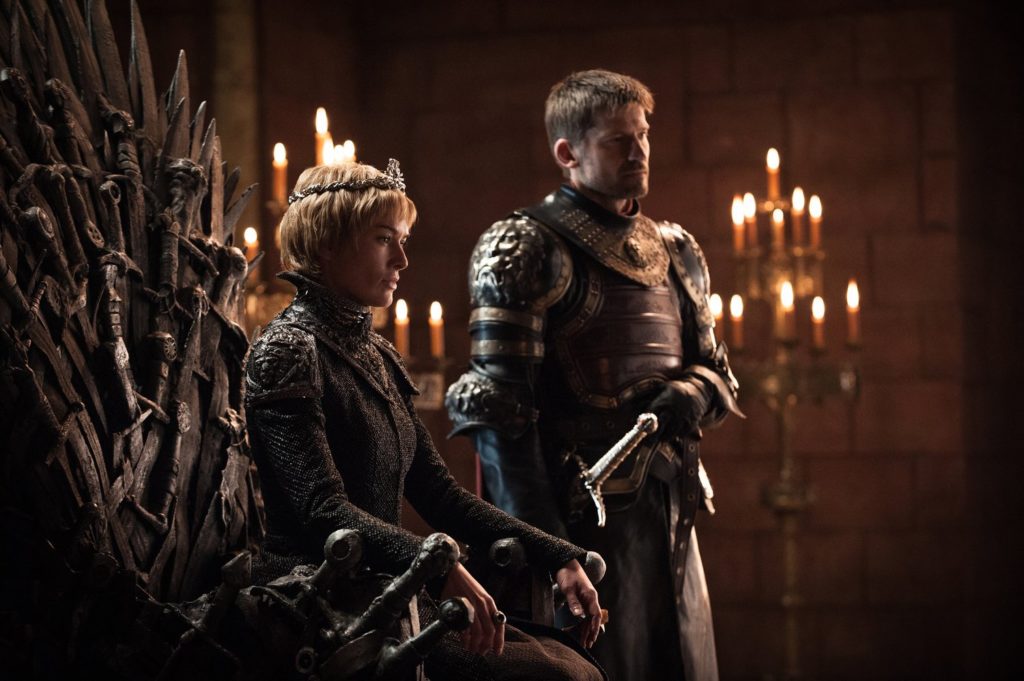
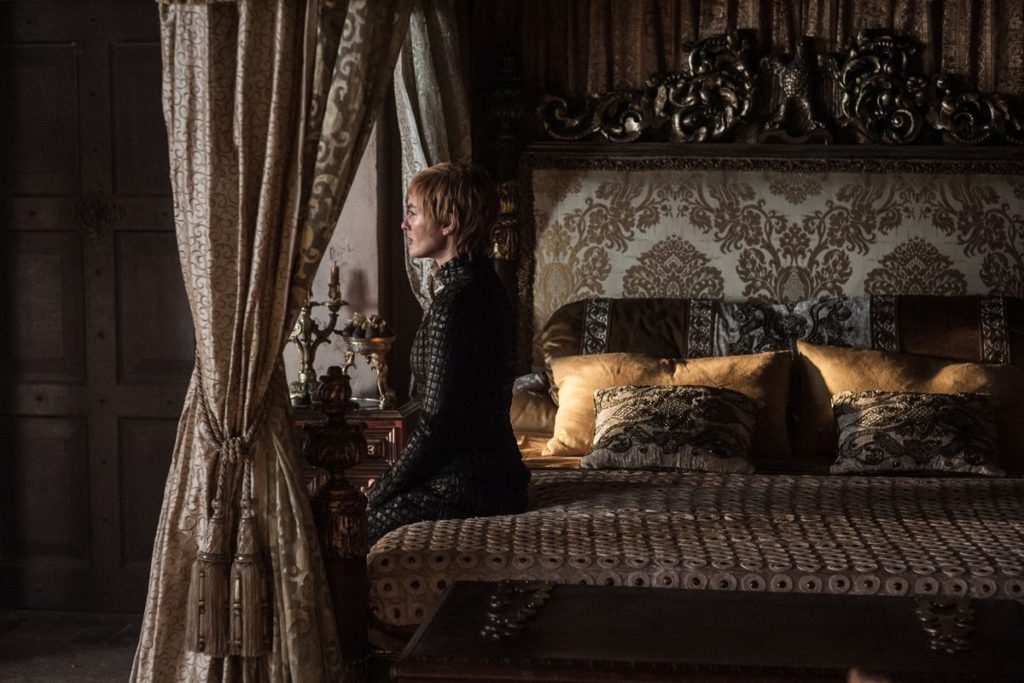
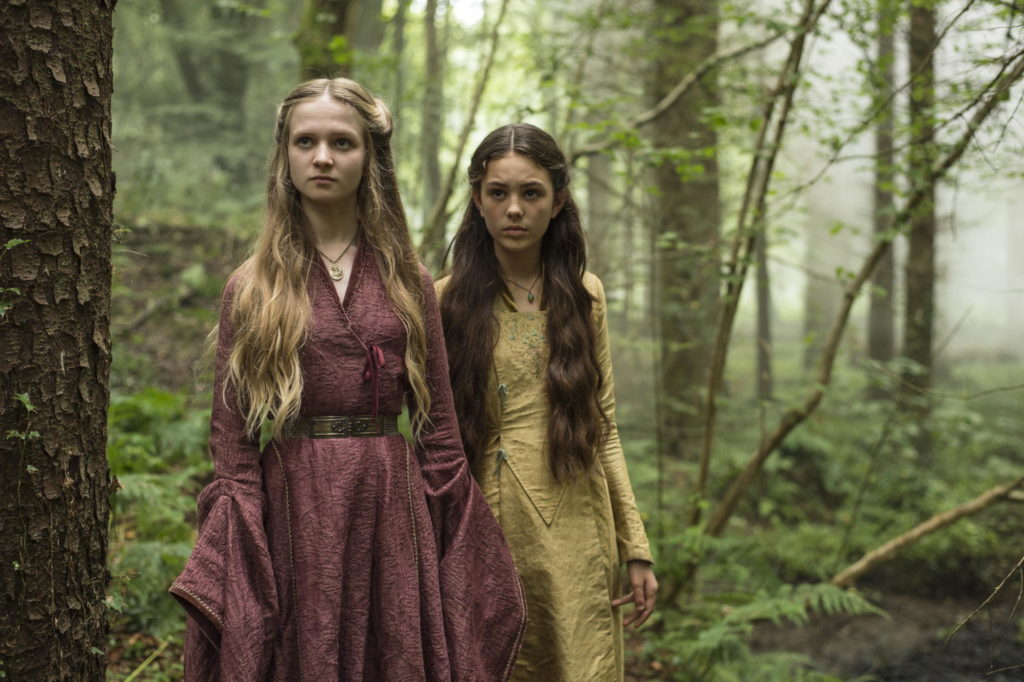
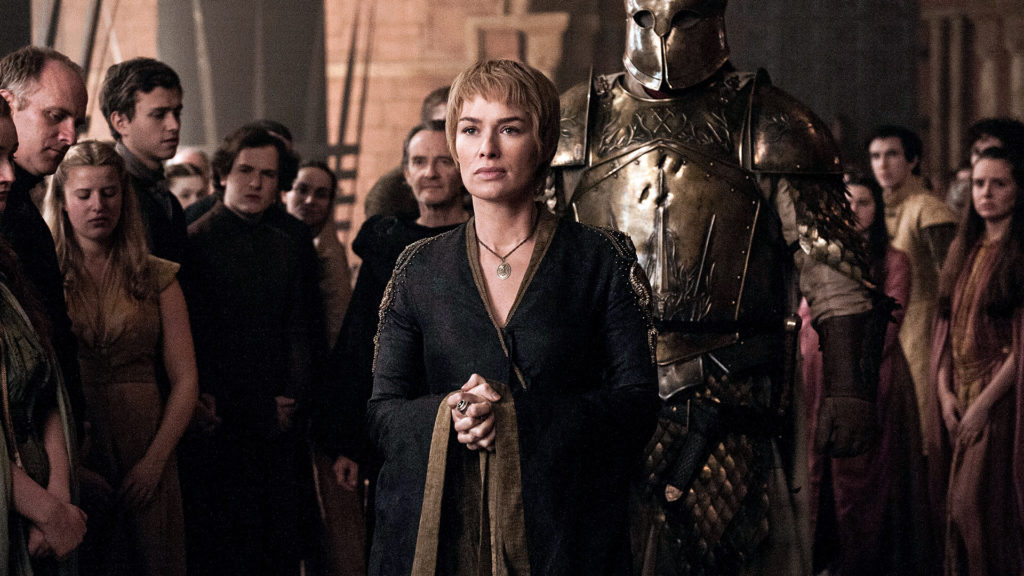
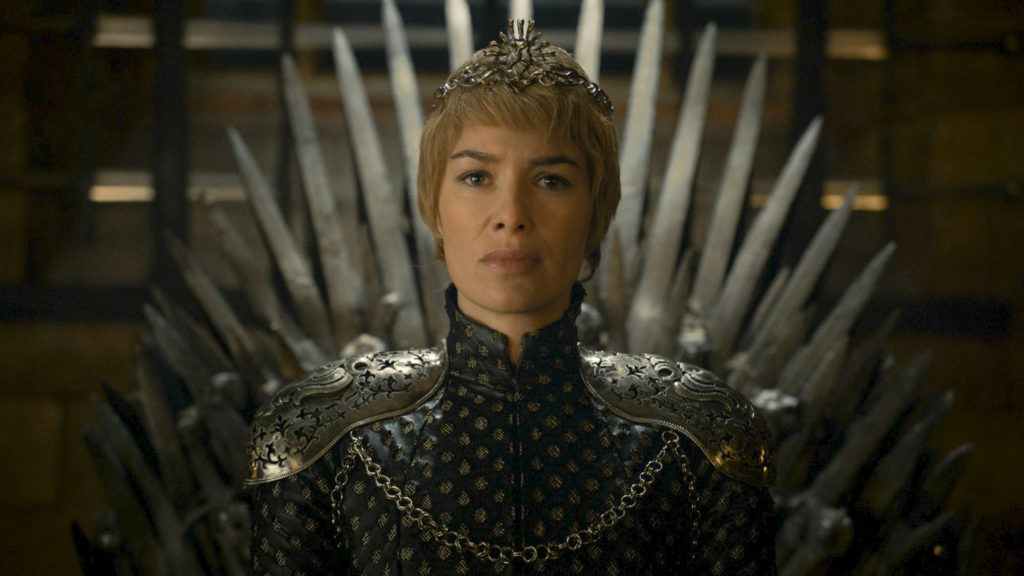
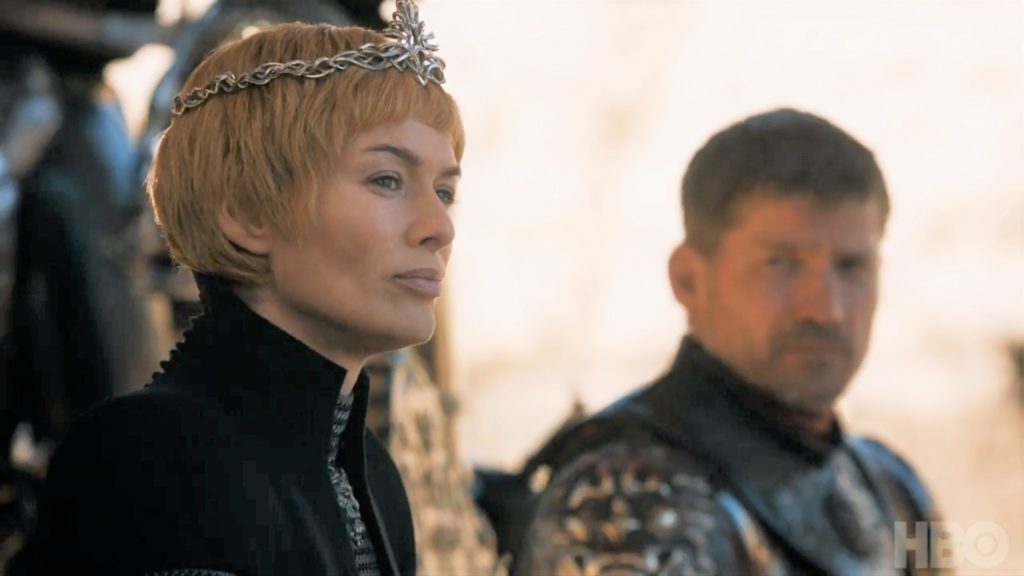
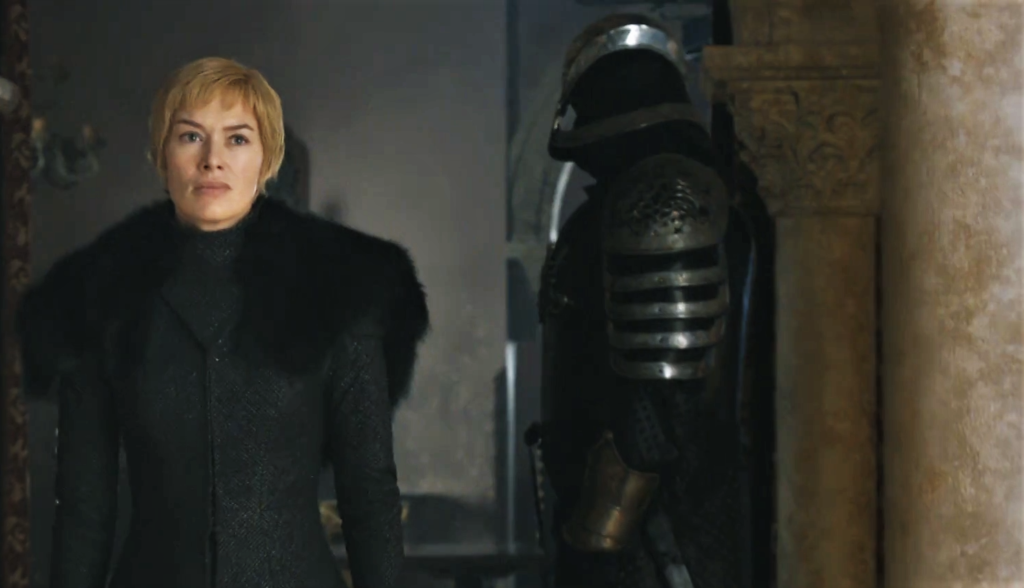
Her finally dying will be one of the highlights of season 8. Amazing villain.
The best written character in this show.
Lena Headey deserves to win an Emmy as soon as possible and I hope she attends the awards ceremony when she does!
I like how some game of thrones characters have changed from the beginning… Cersei – The Hound – Jamie – Sansa … all good
Arya – not so good
Jon – Daenerys – Tyrion … very good but the same every season
DON’T FORGET THEON!
But yes.. some of these characters have had awesome transformations.
Yes! Give her the damn Emmy this time!!!!
What a wonderful summation of her character, one of the most complex and best-written of the series. Thank you!
Well, this analysis suggests at a much greater complexity than I had thought possible. Certainly, book Cersei is a simpler creature. (I hope this hasn’t “spoiled” it all for y’all). The final observation that Cersei has “become” everything she envied in Jaime (and with two good hands, no less!), and thus no longer needs him was really chilling. Heck, she’s even got his sperm in her. Onward to the next incestuous generations!
I remain unsympathetic about how Cersei has progressively “lost” everything she valued. She’s deserved it, and now she’s got her compensation – absolute power. And only her own ambitions, desires, and vengeances to use it on. The extinction of all humankind? A piffle – let them kill off everyone else; it’ll just help ME. Heh, heh, heh. Nope; no sympathy for Cersei from me.
zandru,
I have zero sympathy for her. I understand her, but I have zero sympathy.
Daenerys had to suffer way worse then Cersei and did not become a monster like Cersei.
I imagine that if the show airs on time, it is quite possible that Lena Headey wins the Emmy – it will be kind of a tribute for all her work in GOT.
I am currently rewatching all seasons (Theon’s torture and Oberyn’s death excepted) and I realise that Cersei started out as a character I can relate to. I mean, what a shit time that was when a woman was only seen as a wife or a mother. And her husband was in love with the ghost of another. And her father treated her as shit. And her elder son was a sadistic sociopath. And nobody listened to her. I mean yes, apart from the incest, Cersei was not that bad (kind of like Jaime). Now, of course, she is unbearably bad. So bad, I can’t stand her anymore, although the scriptwriters really do their best to keep her interesting.
By the way, I don’t see her crown as a mane. It always perplexed me because it reminds me more of thorns or horns – like in stag horns.
She can’t die quickly enough.
Thanks to Lena, TV Cersei has become one of the best things about GoT. I hope she gets that Emmy, she deserves it.
After seeing the terrific chemistry between Lena and Peter in this scene, I always thought Cersei committed incest with the wrong brother.
QueenofThrones,
It’ll have to wait until 2018. Because they didn’t start filming for this season until later in the year, by the time GoT aired it was too late for any nominations.
A very well written article and a great read.
I agree that Lena Headey should be awarded an emmy. HBO couldn’t have chosen a better person to portray Cersei. She just does it so well. Her facial expressions, the way she talks and emphasizing syllables to get her point across. She’s a devious bitch for sure and doesn’t give a shit who she brings down to get her own way and to continue with her lust for power.
I guess Cersei’s demise will be inevitable, but I for one hope this doesn’t happen until the last episode ever of GoT – S8E06 😛
Lena Headey’s portrayal of Cersei has put GRRM in a hell of a bind, I imagine. As someone above commented, book Cersei is a rather simple creature. What Lena has done for such a character is nothing short of amazing. (Great writing/direction credit is due, too)
While it was difficult to feel much sympathy for her, you could at least relate to her and her love for her children, as we were reminded throughout the series….must be true, then, right?
After Myrcella’s death, all bets were off with her, I think, and I could no longer relate to her on any level. Lena, though, remained fantastic and I enjoy every scene she’s in. As others have noted, she is the perfect villain.
I, too, see her death as inevitable, and the show won’t be the same when she goes.
A girl is not ready.
Sou,
Yeah, I too didn’t understand the description in the article:
“The crown is quite literally fashioned to look like the mane of a lion…”
It isn’t “literally” fashioned to look like a mane; otherwise, there would be thick tufts of fur/hair surrounding Cersei’s face. Alternatively, if the costume designer “quite literally” fashioned the crown to look like a mane, he or she failed miserably. 🦁
Cersei realizes she became whom she had always imagined Jaime to be. She has the power, the control, the command and now with a new Lannister child on the way, she could have everything she had ever wanted. She puts the decision in his hands as an indicator of that mindset, coolly noting that no one walked away from her
Very nicely written piece. You have her essence, and a good hold on her mental condition, both past and present. She’s another highborn girl whose mind was filled with the “glory” of being a desirable and worthy mate for a prince, just like Sansa’s mind was filled with the same goals by her own parents.
Such a marriage was supposed to be the ultimate ending for Cersei – except she had the courage, or may I say, the balls, to see past being only the pretty appendage of some royal twat. She always felt she could run things better than her husband, and almost as well as her father, and she was determined to prove it, whatever it took. Judging by the absurdly pleased smile on Tycho Nestoris’s face, she’s starting to do a pretty good job of it, despite her horrifying mistakes in the beginning.
Yet, despite her increasing skills at politics, she has made the major mistake most powerful males make, in letting her vanity get the better of her. Worse, her vanity has made her feel increasingly superior to her last true ally, Jaime.
The saying is “Absolute power corrupts absolutely.” She spent her whole life lauding Jaime as the ultimate man, telling him her life would be nothing without him. Now that she’s Queen, she’s changed her mind about him. Her denouncements of Jaime as the most stupid of the Lannisters, her mocking of his preference for hunting and fighting when he was young, were signs that she was on her way to absolute corruption.
All of Jaime’s past devotion to her didn’t assure her continued devotion to him once she was in power. It only made her more certain of her own powers, and caused her to regard him as mindless. She doesn’t any longer want to be Jaime, she’s sure now that she’s better than he is. I’d say that by giving the nod to the Mountain to kill Jaime, she crossed the corruption line.
Just a short time ago, the only person in the world she might have shown any true affection for is the child inside her. Now, I doubt she would even have the same love for a child she once was able to muster. I think she’s become so bad, she will end up treating a child, if it is born, much as men treated her all her life, as a pretty appendage. I was glad Jaime had the courage to finally ride away; I won’t be sorry to see the end of Cersei. But I have to admit, she’s been an amazing character to behold, and Lena brought her to life in a way we won’t forget.
An excellent article, thank you Akash!
Cercei is definitely one of the most interesting characters in the show! I guess that as the writers had pointed out last season, her children were the only thing that kind of ‘humanized’ her. I’m not sure if Cercei is capable of love at all, but I always liked to believe that at least as far as her children were concerned she had at the least ,a mother’s instinct, besides her ambition for power.
But with Jaimie – no she never really loved him and to me that was the most heartbreaking part on Jamie’s arc! I was extremely happy he finally drew a line and managed to break free from her.
I believe that despite the fact Cercei didn’t really love him and she manipulated him, she did, I think, consider him as a ‘safe’ place, and someone that she would always have under her power. I think that the fact he left, might actually come as a shock to her, because she passed all those years considering Jamie as a strong, but stupid and easily manipulated, flat personality. She underestimated him, the way others underestimated her. So, to me, seeing Jamie leave her, was a a very satisfying pay off.
Lena has taken Cercei’s character to a whole new level of acting and she’s been a pleasure to watch! I hope she does get that award!
That said, I hope Cercei is finally killed off before the end of the season! 😀
Same.
The difference: Cersei is a sociopath, just like Joffrey was. Cersei’s sociopathy was tempered by being a woman, having a strong, disciplinarian father, etc. Whereas Joffrey was spoiled, a male, and became a king with absolute power at far too young. So his sociopathy was completely unchecked, to his demise. Cersei’s limitations actually acted enough as a check on her disease to allow her to develop some restraint and intelligence (not enough, though, I’m guessing, it will finally all catch up with her).
Daenerys is blessedly free of this mental illness. Additionally, she proved to be a strong person mentally and emotionally, and overcame her tragedies and circumstances.
Maybe I need to re-read the books, but I don’t think of book Cersei as more simplistic or less interesting of a character than show Cersei. I *do* agree that Lena brought her to life in an incredible way.
It looks like it’s been made from the same bit of old toilet chain that Clapton used for Daenerys’s bit of bling. It’s unimpressive, to say the least.
LOL, toilet chain. I like Daenery’s chain, I think it’s crafted beautifully. But you are all correct about Cersei’s crown, I’m underwhelmed as well
As amazing and wonderfully detailed as some of the other costumes are, they have a hard time envisioning crowns for the kingdom – the Iron Islands driftwood crown was not the greatest either. If they wanted driftwood, at least do it in gold. Any fool can plop driftwood on his head and call it a crown. Cersei’s crown also could have been a bit more ornate.
ginny,
I agree. I think she was always a sociopath, just forced to hide it up until now. And I don’t think Cersei ever even loved her children — her “love” is merely possession. Even when she talks about Myrcella’s death, it is Cersei herself that she sees as the real victim — she asks the Dorne woman “why did you take her from me?” which paints CERSIE as the victim of the crime. And instead of admitting her part in Tommen’s death, she insists Tommen was a traitor. But Tommen didn’t outlaw trial by combat for no reason — the Head Sparrow did that AFTER Cersei showed off the Mountain’s strength by decapitating that other sparrow. Yet Cersei pushed her own failures onto her children. That’s not love. And I also think people misplace the misogyny argument — it is Cersie herself who is the most misogynistic character on the show. There is nothing Cersei hates more than other women. And I think she was always like this, it’s not enduring “hardship” that turned her into a monster. She always was one, only she managed/was forced to hide it until now.
Ten Bears,
You, like many other literate people, have missed the boat. “Literally” now means “figuratively.” (It’s become its own antonym!!) Like the redefinition of those bridle straps that are used to steer horses as “reigns”, it’s the triumph of ignorance via the awesome power of the Internet. Rejoice.
MoaKaka,
I think you’ve nailed it! Speaking of Cersei’s misogyny, I remember during the Battle of the Blackwater where she was scaring Sansa with descriptions of how all the big rapey men who would come bursting in, all ready to rape … and just about smacking her lips in anticipation of what would happen to Sansa and the other girls.
Why does everyone keep saying Cercei had three children? In season one she talked to Catelyn about her grief at the death of her first child, a dark haired Baratheon. So already the prophesy is broken.
zandru,
You mean like “to try and do” sonething instead of “to try to do” something?
Illiteracy is the new literacy.
zandru,
Wait – Another example of a word becoming its own antonym thanks to the information superhighway turned supercesspool:
After the end of last season, I read online complaints that in the very last scene of S6e10, with three dragons and a huge navy and army, Dany was “overpowered.”
I asked myself: “By whom?”
Book Cersei hasn’t had everything taken from her just yet. She’s made some foolish decisions (messing with Aurane Waters, inviting the High Septon to take more power) but we haven’t seen anything beyond her walk of shame in the books. Book Cersei may parallel TV Cersei more than we think. I think calling Book Cersei less dimensional than TV Cersei is premature.
This isn’t related to GOT, but re: “word becoming its own antonym” — does anyone else hate the word “sanction”? Is it a penalty or is it approval? Be one or the other, darn it!
Beautiful essay. I have had exactly the same feelings about Cersei. Like so many women, even here and now in the real world, her only currency is her physical beauty and her only purpose is to be handed off at the behest of a father, brother, even a son to some other man. It’s hard to fly my Team Cersei flag, but fly it I will: Angry women unite, if not look what you could turn into!!!
great article!
Cersei is my second fave after Arya Stark, and i absolutely love her, completely understand some of her motivation and even sympathize with her sometimes.
by far the best written character on the show, and the most interesting. One of the rare instances where the show completely obliterates the book in my opinion. Lena Heady does an astounding job bringing her to life and the fact that she hasn’t won an Emmy yet for her portrayal is pure blasphemy
i love what her character says about patriarchy, about growing up in and having to navigate a world that hates women; i love that we have such a ruthless, badass, cruel, unrelenting, complex character be a woman.
and i will be forever grateful to D&D, despite their many failings, for doing right by her and letting her stay in the show until the end. she’s the only character i’m sure they won’t mess up the ending to, because she’s clearly one of the writers’ favorite
thanks again for the great write up on the ravenous lannister lioness